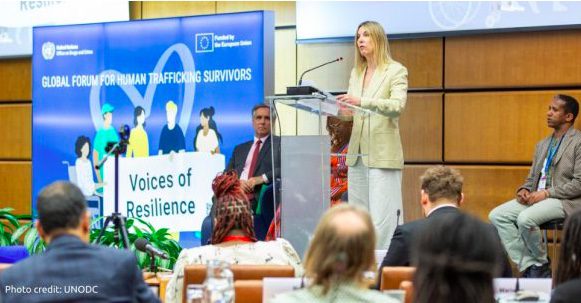
Survivors of modern slavery demand a seat at the table
When we build systems to combat trafficking without survivor input, we risk repeating the very power dynamics that allowed exploitation to happen in the first place. That’s why the United Nations Office on Drugs and Crime (UNODC), supported by the European Union, hosted its first-ever Global Forum for Human Trafficking Survivors in Vienna last month.
Titled Voices of Resilience, the June 24–25 gathering brought over 35 survivor leaders together with governments, service providers, and civil society organizations to shift the global anti-trafficking agenda. The message was clear: survivors must not only be heard—they must lead.
Survivors are more than just their stories
At the heart of the forum was a shift in mindset: survivors are not only witnesses to injustice, but experts in preventing it. They understand how trafficking works from the inside out and their knowledge is indispensable in designing meaningful solutions. This sentiment was echoed by Frey A Worku, a survivor from Ethiopia who said:
“Survivors have often been left out of the very systems meant to address human trafficking, … This has to change.”
Participants emphasized that escaping trafficking is only the beginning. Survivors often face long-term trauma, inadequate justice systems, and recovery services that fail to meet their needs. They also carry the kind of insight that can shift societal awareness. Laurent Ziegler, another trafficking survivor emphasized this point by saying:
“Trafficking can’t be addressed without the involvement of everyone, without society as a whole,”
Additionally, Diane Schmitt, the EU Anti-Trafficking Coordinator, highlighted the reality that many trafficking victims remain invisible. Survivors’ voices are vital not only for designing better support systems, but for helping society recognize trafficking in the first place. Their insight helps shift awareness, challenge misconceptions, and bring hidden exploitation to light.
